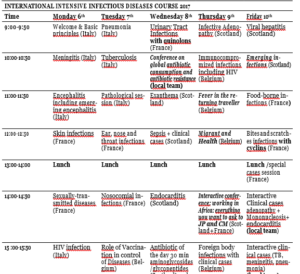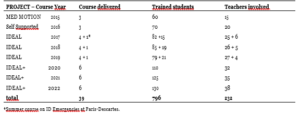The History
It all started from a group of prestigeous European medical schools (Charité Berlin, Antwerp, Edinburgh, Karolinska Stockholm, Semmelweis Budapest, Cattolica Rome, Descartes Paris) partnering since years in Erasmus Projects, and willing to go a step further in this cooperation.
We challenged two very important issues: 1. how to implement student’s international experience and 2. how to homogenize medical curricula around Europe to reach a standardized high level of medical training in EU countries. We were working on “tangible academic internationalization” following the principles of Bologna process, and anticipating what is now routinely evaluated in any European Academic Institutions.
This enthusiastic group, sparkled since 2010 a series of successful Erasmus cooperation projects (CHarME, MED MOTION) that then focused on Infectious diseases teaching. I3DC, late revolving as IDEAL, IDEAL+ and the current IDEALiTER) was implemented with the idea of organizing international focused teaching modules characterized by a commonly agreed core curriculum, officially recognized in each partnering Institution. The peculiarity of these modules was that the courses were held by expert international teach- ers from the various partners Institutions, traveling around Europe to lecture local students. The volunteer local students, and host Erasmus students if interested, would benefit from an international experience since they had selected teachers from different countries, and a newly structured course that was very challenging1.
From the IDEAL+ pro- gramme that started in 2019, we also wanted to introduce challenging new methodology to implement interaction between teachers and students (flipped classes, role playing, case study, clinical cases, serious games) with the aim to enhancing the attractiveness and effectiveness of the course2, 4.
Building up an ID International Intensive Course
Why did we choose to focus on Infectious Diseases? Interestingly, one of the topic suggested by an Erasmus student’s survey was Infectious Diseases (ID) teaching. They felt they needed more teaching about transmit table diseases, predicting what would become the main medical issue of 2019-2020. In addition, ID course turned out to be a challenging choice for manyfold reasons, among which: 1. As suggested by the students survey, ID was taught in European medical curricula in different ways, most of the time it was spread in many, if not all, clinical disciplines which include infectious diseases, occasionally it was an independent course5. This made European medical students very heterogeneous concerning ID knowledge, leading to the need for harmonization. 2. ID is a discipline that continuously requires profound update and new expertises to adapt to patient’s need, such as emerging infections, rapidly increasing internationalization and immigration, different social context, vaccinology, and other global health issues6, 7. It was therefore the ideal topic to challenge cooperation among teachers sharing and complementing their knowledge and clinical experience. Indeed many of them had practiced in the developing countries (Africa, South America and far East), or they were involved in projects to improve the local health system, as in the case of our partners from Global Health Institute, Antwerp University, Belgium8.
In addition, as a part of the IDEAL programme, we also established a very interesting cooperation with some medical Institution of Uganda and we were able to invite some Doctors to join the teaching staff, sharing their experience in managing different tropical ID and dealing with outbreaks such as Ebola.
The core teaching staff (Paris, Rome, Edinburgh) met in Paris to develop the course program, with the aim to blend classical topics with active learning through paradigmatic clinical cases. The course was then enriched by adding complementary issues, such as gender infections, vaccinology, tropical medicine, basic approaches to outbreak management.
Another problem was the fact that students from participating European universities attended the course at different career levels, from 2nd to 5th year. To integrate the ID course into the different European curricula, we had student’s groups from different levels: 3rd year students from Paris and Rome, fresh from microbiology and basic pathology concepts, for this students the ID course was granted as equivalent to the curricular course. Edinburgh students were heterogeneous in levels (from 2nd to 5th year) and was initially very successful because there was no ID focused course in their curriculum. Taking the course, students were granted optional credits. Antwerp groups were composed by more advanced students from 4-5th year and the course was included in the compulsory credits of student’s choice. So how to attract attention by such a diversified student population? The answer was found in new teaching approaches: active involvement of students that, working in small groups, they could learn from each other, exchanging interpretation and reasoning. Indeed, student’s feedback of the course was very important for us. We asked students to evaluate every single lecture and, at the end of the week, the overall course.
Interestingly, despite the heterogeneity in student’s curricular levels, their course evaluation and comments were similar, indicating that the learning approach was effective regardless of the student’s training levels.
In parallel to the course, a learning source was also established on the project website (https://ideal.u-paris.fr/). It contains essential information about the different topics, to be acquired before starting the practical classes. This learning open source is available to anybody wiling to study or to refresh ID topics, containing learning materials from the course teachers or web materials considered useful to the students.
To complete the ID skills, students who followed the course were invited to participate to a summer school held in Paris Descartes where, for one week, they were challenged by ID emergency clinical cases, scientific exercise through games and they experienced, most of them for the first time, ICU (in- tensive care unit) simulation sessions at the Illumen simulation center of Paris Descartes9.
So far we have trained close to 1000 medical students around Europe: we are aware this num- ber is exiguous within the medical student’s population, and that the actual cost of this specific training could be relevant. Of note, all teachers volunteered to this experience with just travel cost reimbursements (see Table 2). While the ratio between students and teachers seems to be disproportionate and probably unreal, we should consider that we trained a fair amount of teachers that learned and experienced this successful methodology, applicable to any clinical courses. Indeed the trained teachers declared to have introduced the newly acquired teaching strategies in their regular courses. In addition, the online training we experienced during Covid19 lockdown, changed our vision of the course.
The Experience of the Covid19 Lockdown
Beginning 2020, when the SARS CoV2 outbreak reached Europe, the first lockdown was declared. At that time, we had just concluded a teacher’s training session held in Paris by a group of experts in medical education (from Dept. Of Medical Education of Utrecht, NL and Aston University, UK) who trained the teachers how to use modern tools to make lectures more attractive and effective10.
We suddenly had to reorganize our International Intensive Infectious disease courses to be held completely online11, 12. It was a big challenge to keep the interactivity with and among the students. Taking advantage of the previous teaching experience and the summer school activities, we used web sources and tools, such as organizing virtual groups to make them work together on a specific topic or on a clinical case. Surprisingly we succeeded in maintaining interaction among students and teachers and the results were satisfactory and rewarding. This circumstance turned out to be an opportunity to experience how web could be instrumental to teaching and learning, an useful and handy resource to complement student’s learning that we should continue using and proposing. We believe that the sudden changes that we had to introduce in medical education and skill acquisition during Covid19 lockdown, is one of the good lesson learned during this terrible pandemic13, 15.
The Future
The project was granted for the third time. IDEALiTER aims at creating a new advanced study programme that addresses unmet basic needs (crisis management, cooperation, communication). It targets EU level health professionals on the frontline of crises and uses innovative training approaches to disseminate these skills. This new project, well situated in the international context, targets more advanced students but also care personnel (medical and paramedical) with working experience, by giving them a more global vision on emerging infections, vaccination, commUnication, media education including an international vision. This project, which involves the previous 7 EU Institutions, aims to prepare the health workforce of tomorrow who will have to know how to react to ID crises that have no borders. The project aims to promote new approaches to training health personnel at European level and contribute to European leadership in the fight against infectious diseases. The innovative nature of the project is reflected in 4 dimensions: content, target audiences, pedagogical methods and a new approach to dissemination by coaching non partner Institutions. The new IDEALiTER project clearly focuses on Global Health issues.
Global Health Involvement
In recognition of our increasingly globalised world, global health is becoming a required component of the medical school curriculum in Europe16. Since the first course we organized in 2015, we focused on “Emerging infections”, to evaluate how those infections spread around the globe and became a burden worldwide. We then addressed the migration related diseases and discussed the interventions of more developed countries to control and contain ID in third countries (see Table 1).
As the years went by, we realized that it was particularly important to sensitize young
Table 1. Agenda of IDEAL course 2017 issue. Global Health related topics are shown in bold italic.


Table 2. Students participating and teachers involved in I3DC and IDEAL courses 2015-2022.

*Summer course on ID Emergencies at Paris-Descartes.
medical students to ID risks and prevention, organizing sessions with practical examples (e.g. traveller vaccination, sensitization and training). When we started with ID emergencies summer course we organized exercises on how to handle an epidemic event, how to do effective prevention by vaccine sensitization etc.
In addition, the participation of medical doctors from Uganda was an extraordinary opportunity to learn their experience on how to manage an outbreak, like in the case of Ebola17.
Concepts of Global health were present from the beginning in our courses, but during these 8 years of teaching, the global health issues acquired increasing relevance in the ID course teaching materials. Calls for decolonizing global health have recently amplified, and medical schools must seize the opportunity to train practitioners better prepared to contribute equitably18.
Finally, the newly approved project IDEALiTER, will concentrate specifically on ID characterization and management in crisis conditions, preparing doctors and paramedics to ID emergency with a specific vision of global medicine and health.
Conclusion
Worldwide increases in global migration and trade have been making communicable diseases a concern throughout the world and have highlighted the connections in health and medicine among and between continents. Physicians in developed countries are now expected to have a broader knowledge of tropical disease and newly emerging infections, while being culturally sensitive to the increasing number of international travellers and ethnic minority populations. Clearly, science is advancing at an amazing pace so there are prioritized topics that need to be taught to medical students, among those, global health issues, comprising emerging infections, migrant health, transmittable disease prevention, religious and socioeconomic implications, investment strategies and their consequences. Exposing medical students to these global health issues encourages students to enter primary care medicine, obtain public health degrees, and practice medicine among the poor and ethnic minorities. We aspire to promote a generation of socially conscious physicians better prepared to care for an increasingly diverse global citizenry, no matter where they practice in the world.
Our International intensive ID course was the perfect opportunity to instill global health concepts to undergraduate students by providing concrete examples of IDs not only in term of prevention and management, but also related to socioeconomic implications.
